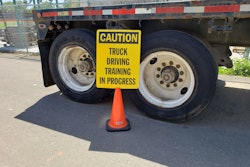As the U.S. and Canadian governments prepare vaccine mandates for all types of border crossings, commercial hauling included, the two countries face a "perfect storm" of regulatory risks to retention and recruiting that could see as many as 20,000 Canadian drivers and 16,000 U.S. drivers unable to move freight internationally during the biggest supply chain crunch in history.
Beginning in early January 2022, the United States Department of Homeland Security will require proof of vaccination from foreign national travelers crossing U.S. land or ferry ports of entry. The same vaccination requirement began in November for non-essential travelers entering the U.S.
In Canada, beginning Jan. 15, 2022, truck drivers and other groups of travelers who have been exempt from entry requirements will only be allowed to enter Canada with proof of full vaccination. In this context, "full vaccination" means either two doses of the Pfizer, Moderna, AstraZeneca, Covaxin, Sinopharm or Sinovac vaccines; or one dose of the Janssen/Johnson & Johnson vaccine. The same applies to enter the U.S. for Canadian drivers but for additional acceptance of two doses of the Covishield vaccine.
In the U.S., many trucking organizations and individual truckers have come out strongly in opposition to President Joe Biden's vaccine mandate aimed at employers of 100 or more people -- that's actually less strict than the cross-border requirements as it allows for weekly testing in lieu of vaccination.
[Related: Why are you holding off on the COVID-19 vaccine, driver?]
The new vaccination requirement "is making a bad situation a lot worse. It’s the perfect storm,” Canadian Trucking Associaiton president Stephen Laskowski told the Toronto Star, whose headline warned of potential supply chain "horrors" in the new year.
“In light of worldwide supply chain disruptions and delays, it’s unclear how the supply chain and the trucking industry, in particular, can withstand further turmoil and maintain the service levels required to deliver critical products Canadians and Americans need," Laskowski said in a statement.
Todd Spencer, president of the Owner-Operator Independent Drivers Association, told Overdrive that the move to regulate a personal health decision like vaccination status could force drivers out of long haul trucking.
"Throughout the pandemic, essential workers like professional truckers have continued operating safely back and forth across the Canadian border to ensure North Americans have the food and supplies they need," Spencer said in a statement. "Drivers have done so without having to disclose their personal health history. We have seen all too often how unnecessary government mandates can force experienced owner-operators and independent truckers out of business. These requirements are another example of how impractical regulations will send safe drivers off the road."
Mike Millian, president of the Private Motor Truck Council of Canada, told Overdrive that "70% of the 700 billion in trade between Canada and the US is moved by truck. 120,000 Canadians are involved in cross border movements, and 40,000 U.S. drivers."
Based on vaccination rates in both countries, Millian estimates "we are likely to see roughly 20,000 Canadian drivers and 16,000 U.S. drivers removed from the cross-border freight industry. This will have a dramatic effect on supplies and services reaching their destination and getting in the hands of those who need them."
[Related: COVID vaccine requirement looming for cross-border truckers]
The PMTC and OOIDA both separately encouraged drivers to get vaccinated against COVID-19, but both acknowledge that even a small percentage of unvaccinated holdouts within cross-border trucking could sting in an already tight freight market.
The most recent estimates from the American Trucking Associations place the so-called "driver shortage" at 80,000 with a chance of doubling by 2030. Many fleets have now explored increasing pay, paying for detention times, and allowing for overtime pay or other bonuses as the supply chain strain becomes a national news story.
The House Transportation and Infrastructure Committee in November heard from industry experts on the perceived "driver shortage" and among the informed opinions were calls for deregulation or new approaches to onerous mandates, including those pertaining to the COVID-19 vaccine.
[Related: Is it 'overtime' for company truck driver overtime pay?]












